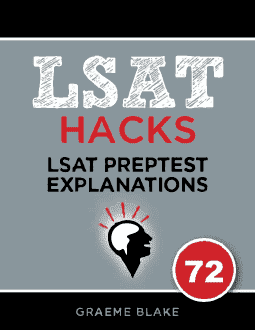QUESTION TEXT: Council chair: The traditional code of parliamentary…
QUESTION TYPE: Weaken
CONCLUSION: We should use the alternate parliamentary code.
REASONING: There are some problems with the current code. The alternate code has worked in other areas.
ANALYSIS: There are always at least three options when there are problems with a system:
- Do nothing.
- Fix the problems with the system.
- Use another system.
The council chair has said we must do number three. They’ve proven number one is not a good option. But they haven’t eliminated number two.
___________
- This doesn’t matter. The stimulus already said that the way the rules have been used has been enough to weaken public confidence.
- It doesn’t matter if the alternate code has had occasional problems. The key point is that it has been used “successfully” elsewhere. That is enough.
- CORRECT. See the three options above. The council member says we must do option 3: choose a new code. But this answer says option 2 is also a possibility: fix the current code. Fixing the problems might restore public confidence.
Therefore, it is not true that we must replace the code. - It doesn’t matter if changing codes is not always reasonable. Maybe this answer just means it would have been unreasonable to change the codes during World War II.
We only care whether it’s reasonable to change the codes right now. And the author’s evidence indicates a change is reasonable: the codes have been successfully used elsewhere. - This strengthens the argument! This answer says the alternate code has no obvious problems.


Why doesn’t the reasoning that rules out A also rule out C? Couldn’t it be argued in both cases that the damage has already been done?
The difference is that in C, remedies to the damage are already underway, meaning that there is no need to use the alternate parliamentary code (hence, weaken). In A, no action is being taken to address the problem, even if it’s only presenting intermittently.
Can you please expand on the explanation for why answer choice B is incorrect?
The premises say that the 1) obscure rules cause arguments over procedural details, and in turn, 2) are not good for public confidence; however, 3) success in the council’s endeavors depends on public confidence.
Answer choice B says that in places where the alternate code has been adopted, there have been some instances where members have attempted to use it to obscure opponents’ understanding of procedures.
When I looked at this question, I thought that answer choice B would undermine the conclusion because it would indicate that the problems caused by premises 1) and 2) would not be solved, which would impact 3), along with the conclusion.
Your breakdown of the argument against the current code is good, but you’re missing one crucial premise of the overall argument; the author concludes that the alternate code should be adopted because it’s “been in successful use elsewhere” for an extended period of time. (B) suggests some potential issues with the alternate code, but this doesn’t negate the fact that overall it’s been used successfully. So, it’d still be favourable to the current, unsuccessful code.
Furthermore, (B) still falls a bit short of weakening the premises you’ve mentioned–just because opponents attempt to use the alternative code in a deconstructive way, doesn’t mean that their methods lead to “interminable arguments” that would weaken public confidence in the same way that the traditional code does.